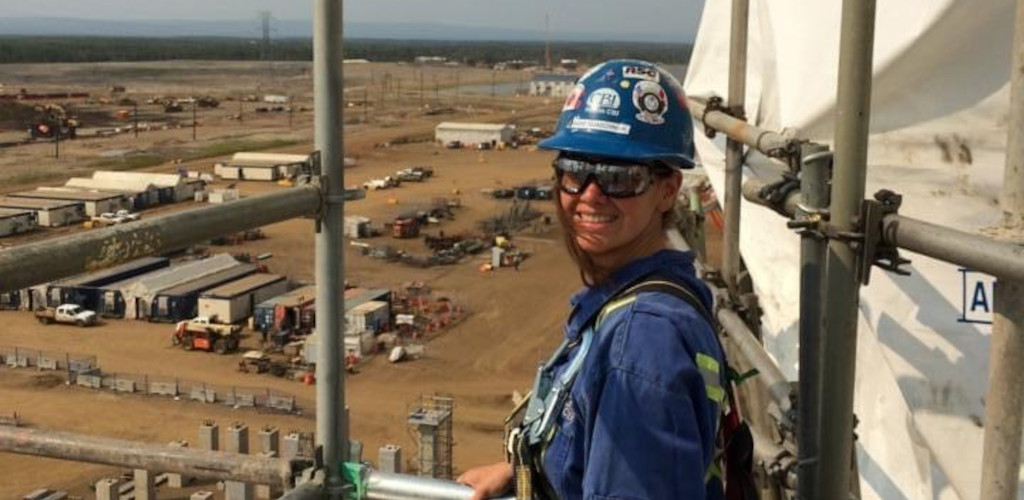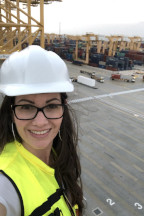“Invisibility” of Women Stalls Progress

By Asma Ali Zain
_5.png) Empowered women help economies thrive, fuelling growth and development around the world. Research clearly shows that improved economic growth and better commercial business performance go hand-in-hand with increased gender equality.
Empowered women help economies thrive, fuelling growth and development around the world. Research clearly shows that improved economic growth and better commercial business performance go hand-in-hand with increased gender equality.
Some industries dominated by men, however, are far from achieving an ideal balance of power, which means women have to go above and beyond to break the glass ceiling.
Women make up a mere two percent (around 24,000) of the world’s maritime industry, including the 1.2 million seafarers. As a subset, the gender ratio in breakbulk logistics and project cargo mirrors that breakdown. Despite their low presence and workplace challenges, including in the Middle East, women are bringing diversity by slowly entering the industry, some taking positions at the very top.
So, what can inspire more young women to join the global maritime workforce?
With industry experience of over 25 years, renowned shipping and oil gas lawyer, Rania Tadros said that men leading by example can help for a start.
“Someone once said that there are no role models and I interpreted that there were no role models for women but then I realized that she was talking about role models for men.”
 Originally from Egypt, Tadros is a managing partner at Stephenson Harwood, LLP in Dubai and represents an array of energy clients, ship owners, transportation companies and P&I clubs in a wide range of shipping-related disputes. She has considerable expertise in both arbitration and litigation.
Originally from Egypt, Tadros is a managing partner at Stephenson Harwood, LLP in Dubai and represents an array of energy clients, ship owners, transportation companies and P&I clubs in a wide range of shipping-related disputes. She has considerable expertise in both arbitration and litigation.
“You see, men can’t see women performing these roles, so they don’t think about it. They don’t understand that a woman can perform a role even if she has a family or not or whatever her circumstances are because they’ve never seen it so they can’t imagine it.
“On rigs, it means being way for months so probably men assume that women can’t be away for so long from their families. And the reality is that this has been the situation because women haven’t done it; but I don’t think there is a physical impediment to this. It is all about attitude and giving them an example.”
Gender Learning Curve
Tadros, who joined a law firm in the maritime industry in 1998 in the UK and started work with a female partner, said she did not have any fears about the industry being male dominated. “I also had gone to an all women university, so I hadn’t been exposed to any sort of discrimination because of the fact that I was a woman.”
Over the years, however, the conversation changed as she gained experience.
“Slowly things did suggest that I was disadvantaged and that male domination in the industry was an issue. For example, once I had to go on board a rig to take evidence and there were no women on the rig – all men. I felt strange but it was all fine.”
In terms of the industry itself, there are very few female crew aboard vessels. “The number of women masters and rig leaders is very few and even fewer are able to get leadership opportunities in these environments, which is partly because there are so few of them in the whole system,” Tadros explained.
She added: “If we look at the maritime legal field, there are a lot of women partners but if you look at the proportion, it is very small. In any law firm and their shipping team, they will have 50-60 percent women at the junior level and only 20-30 percent who are partners. So, there is a real imbalance. They are coming through the system, but they are not going all the way through and there are lots of reasons for that; but I think that we now have more women being given leadership opportunities.”
For industry leader Stephanie Schooley, the experience has been very different.
 The logistics manager, who currently works at Petrofac in Sharjah, has worked in a number of industries that are predominantly male oriented. From manufacturing to the auto industry to oil and gas and then supply chain and logistics, Schooley has been part of workplaces where women only held HR and administrative positions.
The logistics manager, who currently works at Petrofac in Sharjah, has worked in a number of industries that are predominantly male oriented. From manufacturing to the auto industry to oil and gas and then supply chain and logistics, Schooley has been part of workplaces where women only held HR and administrative positions.
“I’ve kind of unintentionally put myself in male-dominated industries. In some places, I was one of only two women out of 200 men,” she said.
Schooley, who has been based in the Middle East since 2015, said that there are only a handful of women in this field area and they are often overlooked.
“I never really had any negative experiences. But what I’ve noticed is that women are completely over-looked. They’re not the first on someone’s mind when a position comes up. Men don’t immediately consider that the women sitting there are perfectly capable and have transferable skills to do that job.”
In the auto industry, she added, it was a struggle to find women production supervisors. “There were maybe two or three women out of at least 50 men. I was young and was relatively new, so men gave me a hard time, but I managed and didn’t take it personally.”
Now, as a logistics manager, Stephanie is hiring freight forwarders and dealing with different service providers which is a challenge in itself.
“Even though it’s a male-dominated industry, I’ve had tremendous support from male leadership, especially here in the Middle East, despite the cultural challenges and language barriers.”
Women in Leadership
Interestingly, these women share an insight that their leadership positions were relative to their geographical location. “If I’m honest, I think I was given the leadership opportunity because I came to the UAE. Historically, women who’ve worked very long hours and pushed a little bit harder have gotten leadership opportunities,” Tadros said.
Likewise, Schooley agreed that professional growth can be relative to your location. “Although it was tough, I got a leadership position when I came to the Middle East. I heard about the position, and they decided that they wouldn’t be sending a woman to the Middle East, which is a North American situation perspective, but because of my ability, my drive and willingness, I got the job. I feel like sometimes women are afraid of asking questions because they feel it makes them look weak, but I think that, in fact, it shows initiative.”
Why is diversity important in the workplace? The International Maritime Organization points out that investment in women gives a progressive boost not only to communities and companies, but even to countries by improving economic growth and commercial business performance through increased gender equality.
“I think diversity is important in the workplace, not just from a woman’s perspective, but culturally as well. You need as much input and influence and experiences and information [as possible] to collectively form a better decision,” Tadros said.
“I do think I bring something different. I do bring diversity and I do sometimes think differently because of where I come from,” she added.
According to Tadros, although women need to set leadership examples, they also need to have their own style.
“I lead in my own way and that gives other women an example, which I guess is positive but at the same time, my way is only one way. Other women might want a different leadership style. And if they don’t act in the same way, they feel that they can’t progress.”
Schooley added that she doesn’t know very many women in leadership positions in the field. “Things are certainly moving but not significantly and proportionately. We’re probably less than five to 10 percent, maybe even less than that in this field.”
She also says that women need to create opportunities for themselves by putting in the extra effort. “You can’t wait for them to come to you because they won’t. You have to ask for what you want. If you hear of an opportunity, you have to raise your hand and say ‘I’m willing to do it’.
“I was in my 20s and had to work seven days a week. I had to go above and beyond, more than what a typical male would. In 2007, I went on maternity leave and then the recession hit. I was lucky to retain my job. The point I’m trying to make here is that women can lose their momentum while men don’t.”
To build awareness about their presence in male-dominated industries, women need to place more confidence in their knowledge, Tadros added.
In the breakbulk and project cargo industry, women need expertise because of the specialization. “Generally, women don’t have as much confidence in their own knowledge as much as guys do. It’s a huge generalization, but because it’s an extra ultra-specialized industry, I think this feeds the lack of confidence as well,” she added.
But, as Schooley concluded, there are a lot of women who have an incredible amount of knowledge in this industry; “they just need to be willing to put themselves out there and say ‘I can do this’.”
Asma Ali Zain is a Dubai-based journalist with over 20 years’ experience in writing for and editing business-to-business publications.
PHOTO: Stephanie Schooley at Fort McMurray oilsands in Alberta, Canada. CREDIT: Stephanie Schooley
